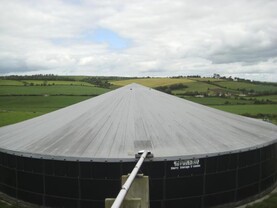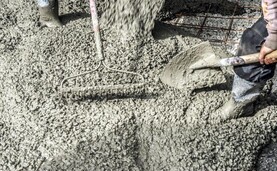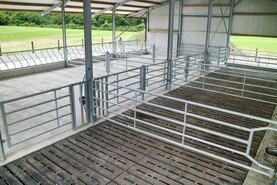This week details of new TAMS III incentives for farmers to invest on farm were released. The details released on the scheme so far are positive and the flexibility and options available to farmers have increased in the main. Smaller-type yet significant investments that really benefit the efficiency, safety and welfare on farms are now attracting grant aid, which is hugely positive.
Far from being a freebie for farmers, if nothing else the announcement of some of the scheme details highlights the extensive investment made by farmers every year in rural Ireland. This is investment in land and farms outside of the M50, where real thriving businesses that last for generations are situated.
Over €1bn annually is spent on investment in Irish farms to futureproof, improve, and reinforce the existence of farms and by default the farm service sector.
This is what makes the wheels turn for the 180,000 people that are employed as a result of the output from Irish farms up and downstream of farms across rural Ireland.
Infrastructure
The move to facilitate the grant aid of infrastructure that allows more grazing is positive and reflects positively on reinforcing a stronger more resilient industry.
Of course, the necessary investment on slurry storage allowing farmers to utilise nutrients better is also positive. However, our competitive advantage in Ireland remains in producing protein from grass and as long as that is the case, farmers should be incentivised to follow that path.
In other European countries we have seen significant investment in indoor-type systems that might temporarily solve a problem for the sector. However, ultimately, excessively high stocking rates which mean the farmer has to import more feed on to the farm mean higher risk for the farm and the environment. Consequently, we see huge reductions in stock numbers being forced on some EU farmers (eg in the Netherlands).
This is the very reason why we need to keep organic nitrogen (stocking rate levels) that allow us follow the grass-based production system.

Any reduction on 250kg organic nitrogen is counterproductive and forces Irish farmers into systems that cause more problems than they solve.
Yes, of course we must improve water quality, of course we need to be mindful of sensitive catchments, but blanket stocking rate reductions have never been shown in an Irish context to be positive for the environment as far as the science is concerned.
Work to be done
The Department of Agriculture still has work to complete on TAMS III. It needs to come out as soon as possible with the terms and conditions of these new schemes.
Investment on farm takes time and careful planning. Any restrictions that rule farmers in or out of investment grant aid need to be explained sooner rather than later. Half a story without the full detail is worse than no story at all, especially when it comes to taking out loans, investing in the future to meet new conditions and future-proofing Irish family farms.
Aligned to CAP reform, changes farmers are making this year are hugely important and involve significant investment in land leasing and purchase.
Full visibility and knowledge of the financial spend for on-farm investment is absolutely crucial to these businesses and should be in place as soon as possible.
The agri food sector is Ireland’s oldest and largest indigenous exporting sector – this new scheme should help set up the next generation of young farmers.
Focused on doing what is best for Irish farming
and farmers
I am both honoured and excited to be appointed the fourth editor of the Irish Farmers Journal, which I believe is one of the most important roles in Irish media and an integral part of the Irish farming community since the foundation of the paper in 1948.
I am fortunate to inherit an award-winning team who are focused on producing high-quality, unique and valued content for our readers, both in print and online.
I would like to thank my immediate predecessor in this role, Justin McCarthy for his invaluable contribution in leading the business since 2013 and the opportunity to work as his deputy editor.
Our vision and mission of the Irish Farmers Journal is always to do what is best for Irish farming and farmers. This means continuing to develop and evolve to meet the changing needs of farmers and agribusinesses across the island. This is only possible with your support.
As editor, my commitment to you is that we will continue to invest in bringing you the best possible technical advice, opinions and news analysis relating to farming, food and rural living.
Our team will continue to innovate and challenge conventional thinking, to support, inform and serve farmers, their families and wider rural communities.
If you have any feedback or suggestions for me or the team, please email me at jkennedy@farmersjournal.ie
This week details of new TAMS III incentives for farmers to invest on farm were released. The details released on the scheme so far are positive and the flexibility and options available to farmers have increased in the main. Smaller-type yet significant investments that really benefit the efficiency, safety and welfare on farms are now attracting grant aid, which is hugely positive.
Far from being a freebie for farmers, if nothing else the announcement of some of the scheme details highlights the extensive investment made by farmers every year in rural Ireland. This is investment in land and farms outside of the M50, where real thriving businesses that last for generations are situated.
Over €1bn annually is spent on investment in Irish farms to futureproof, improve, and reinforce the existence of farms and by default the farm service sector.
This is what makes the wheels turn for the 180,000 people that are employed as a result of the output from Irish farms up and downstream of farms across rural Ireland.
Infrastructure
The move to facilitate the grant aid of infrastructure that allows more grazing is positive and reflects positively on reinforcing a stronger more resilient industry.
Of course, the necessary investment on slurry storage allowing farmers to utilise nutrients better is also positive. However, our competitive advantage in Ireland remains in producing protein from grass and as long as that is the case, farmers should be incentivised to follow that path.
In other European countries we have seen significant investment in indoor-type systems that might temporarily solve a problem for the sector. However, ultimately, excessively high stocking rates which mean the farmer has to import more feed on to the farm mean higher risk for the farm and the environment. Consequently, we see huge reductions in stock numbers being forced on some EU farmers (eg in the Netherlands).
This is the very reason why we need to keep organic nitrogen (stocking rate levels) that allow us follow the grass-based production system.

Any reduction on 250kg organic nitrogen is counterproductive and forces Irish farmers into systems that cause more problems than they solve.
Yes, of course we must improve water quality, of course we need to be mindful of sensitive catchments, but blanket stocking rate reductions have never been shown in an Irish context to be positive for the environment as far as the science is concerned.
Work to be done
The Department of Agriculture still has work to complete on TAMS III. It needs to come out as soon as possible with the terms and conditions of these new schemes.
Investment on farm takes time and careful planning. Any restrictions that rule farmers in or out of investment grant aid need to be explained sooner rather than later. Half a story without the full detail is worse than no story at all, especially when it comes to taking out loans, investing in the future to meet new conditions and future-proofing Irish family farms.
Aligned to CAP reform, changes farmers are making this year are hugely important and involve significant investment in land leasing and purchase.
Full visibility and knowledge of the financial spend for on-farm investment is absolutely crucial to these businesses and should be in place as soon as possible.
The agri food sector is Ireland’s oldest and largest indigenous exporting sector – this new scheme should help set up the next generation of young farmers.
Focused on doing what is best for Irish farming
and farmers
I am both honoured and excited to be appointed the fourth editor of the Irish Farmers Journal, which I believe is one of the most important roles in Irish media and an integral part of the Irish farming community since the foundation of the paper in 1948.
I am fortunate to inherit an award-winning team who are focused on producing high-quality, unique and valued content for our readers, both in print and online.
I would like to thank my immediate predecessor in this role, Justin McCarthy for his invaluable contribution in leading the business since 2013 and the opportunity to work as his deputy editor.
Our vision and mission of the Irish Farmers Journal is always to do what is best for Irish farming and farmers. This means continuing to develop and evolve to meet the changing needs of farmers and agribusinesses across the island. This is only possible with your support.
As editor, my commitment to you is that we will continue to invest in bringing you the best possible technical advice, opinions and news analysis relating to farming, food and rural living.
Our team will continue to innovate and challenge conventional thinking, to support, inform and serve farmers, their families and wider rural communities.
If you have any feedback or suggestions for me or the team, please email me at jkennedy@farmersjournal.ie







 This is a subscriber-only article
This is a subscriber-only article









SHARING OPTIONS: